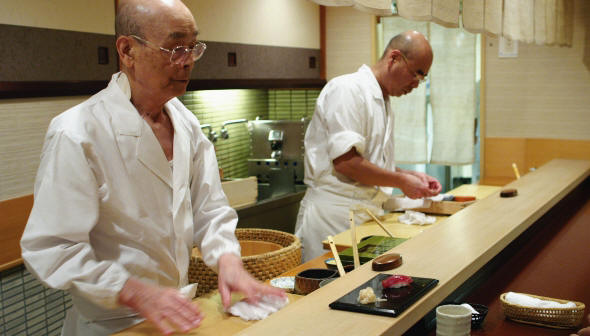MOVIE REVIEWS |
INTERVIEWS |
YOUTUBE |
NEWS
|
EDITORIALS | EVENTS |
AUDIO |
ESSAYS |
ARCHIVES |
CONTACT
|
PHOTOS |
COMING SOON|
EXAMINER.COM FILM ARTICLES
||HOME


Friday, March 9, 2012
MOVIE REVIEW
Jiro Dreams Of Sushi
The Father, The Son And That Oh-So Holy Sushi

Jiro Ono (left) and his eldest son Yoshikazu at Jiro's restaurant in Japan, in
David Gelb's documentary "Jiro Dreams Of Sushi".
Magnolia Pictures
by
Omar P.L. Moore/PopcornReel.com
 FOLLOW
FOLLOW
Friday, March 9,
2012
David Gelb's documentary "Jiro Dreams Of Sushi",
which opened today exclusively in New York City at the Lincoln Plaza Cinema,
chronicles an octogenarian in Japan's Jiro Ono, a world-famous sushi chef who
has been making sushi for 75 years. Early on he tells us one of his many
philosophies: "You must spend your life working to perfect your craft."
Though he insists he's not a perfectionist, he strives for perfection, and his
rigorous, exacting work ethic has produced what patrons at his restaurant
declare as Japan's, if not the world's best sushi. No one has ever left
Jiro's restaurant dissatisfied, insists Japan's renowned national food critic,
who confesses he is intimidated every time he visits.
"Jiro Dreams Of Sushi", a symphony of food philosophy, industry, and feast for
the senses, is a fascinating look at the spirituality and divinity of process,
with food as its object. This documentary allows us unfettered access to
Jiro and his family of sushi preparers and restaurateurs; he persuaded both of
his sons to skip college and help him with his restaurant. They did, and
both appear the better for it. We see the tuna sellers, the relationships
Jiro has with them. We get a portrait of Jiro's upbringing and family
history, of his successes and failures, and the drive, discipline and daily
routine that enervates this principled, serious yet humorous and sweet man.
Jiro is extremely demanding of himself, and cuts a formidable, intense figure
for his customers, standing inches from them as they eat his freshly-prepared
delicacies. He takes special note of the feng sui, if you will, of his
patrons: specifically how they eat their food, which hand they eat it with, and
how slowly or quickly they finish, timing each serving of a new round of sushi
delicacies and doling out quantities according to the pace of eating and the sex
of the consumer. The undeniable artistry of process is the heart of "Jiro
Dreams Of Sushi" which always enraptures us with its touching stories and Jiro's
principles.
I thoroughly enjoyed this documentary, and though I don't like sushi (owing to a
horrendous experience with it years ago), watching Mr. Gelb's film and Jiro
Ono's sushi made me want to eat it immediately. A trip to the Far East may
be in order!
Mr. Gelb's camera captures lush, mouthwatering pieces of sushi for our
consideration, as if being paraded for a beauty contest. There's a gentle
suggestiveness (perhaps unintended by Jiro), even eroticism, in the way pink
phallic slices of sushi are placed on a plate, swelling very slightly then
contracting. Jiro stokes them with a marinade brush in a precise yet
sensual manner, as if quickly and delicately stroking a woman's leg or thigh.
All of the moves Jiro performs with sushi look balletic; it's ceremonial and
respectful food worship, with minimalism as the highest, most essential
ingredient that punctuates Jiro's presentations. I marveled at the
unwavering standards Jiro sets, and Mr. Gelb allows an unfiltered glimpse of a
master craftsman at work, painting and preparing the very part of life -- the
only part of life beyond his sons -- that appears meaningful to Jiro.
While some scenes of tuna and fish meeting their fate -- including a brief shot
of a small, live fish being eviscerated -- will turn off some viewers (and
activists), there's an attempt, albeit fleeting, on the filmmaker's part, to get
the balance right. Jiro's eldest son Yoshikazu needs fish for his own
restaurant but sincerely decries the wholesale slaughter of fish, especially the
youngest ones, which Japanese trawlers have increasingly included in a wider net
of capture.
These types of moments described above, and another where huge slabs of cut up
tuna are on display at a market, are the riskiest, and will alienate some.
Yet what Jiro and Mr. Gelb endeavor to show is the totality, intricacy and
interdependence of elements that comprise the sushi journey to one's palate.
It's all in the process, and Jiro is nothing if not a study of dedication,
tradition and transition. There's a totality of immersion in family, food
and franchise, as both ritual and oneness. Mr. Gelb aspires to meet this
same oneness in the way he crafts his documentary: a quiet, efficient, flowing
piece at a slender 82 minutes, and he showers a hagiographic glow on Jiro in the
film's climax -- the only false move that "Jiro Dreams Of Sushi" makes.
Punctuated by music from Philip Glass, including his wonderful orchestrations in
"The Hours", music featured in the same-titled 2002 film, "Jiro Dreams Of Sushi"
excels as a triumphant, poignant spectacle of a wise, spiritual master food
maker who knows that at 85 his work is not done. "I couldn't retire now.
I've still got so much to do," Jiro says, and we know that he means every word.
"Jiro Dreams Of Sushi" is rated PG by the Motion Picture
Association Of America for mild thematic elements and brief smoking. There
is also the matter of fish being eviscerated, with brief scenes of such that may
upset some viewers. The film is in the Japanese language with English
subtitles.
The film's running time is one hour and 22 minutes.
COPYRIGHT 2012. POPCORNREEL.COM. ALL RIGHTS RESERVED.  FOLLOW
FOLLOW
MOVIE REVIEWS |
INTERVIEWS |
YOUTUBE |
NEWS
|
EDITORIALS | EVENTS |
AUDIO |
ESSAYS |
ARCHIVES |
CONTACT
| PHOTOS |
COMING SOON|
EXAMINER.COM FILM ARTICLES
||HOME


 FOLLOW
TWEET
FOLLOW
TWEET FOLLOW
FOLLOW